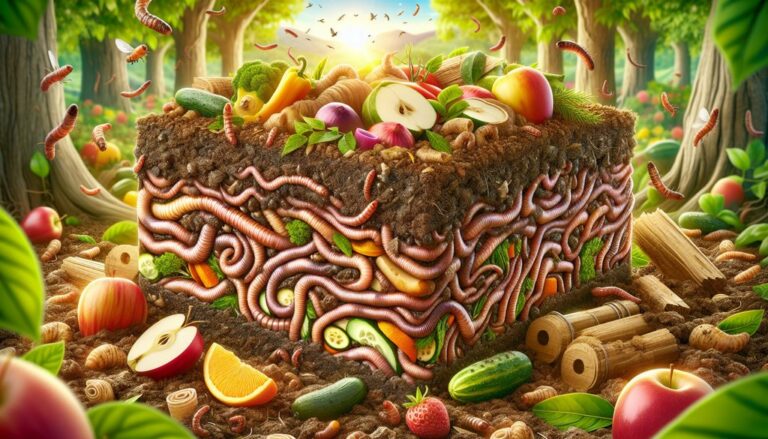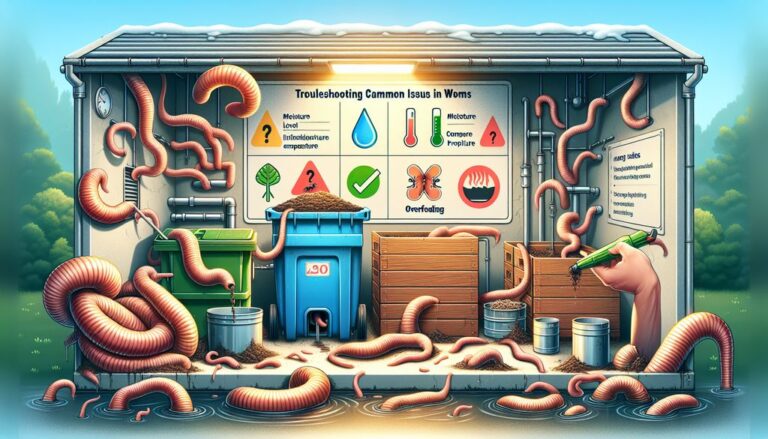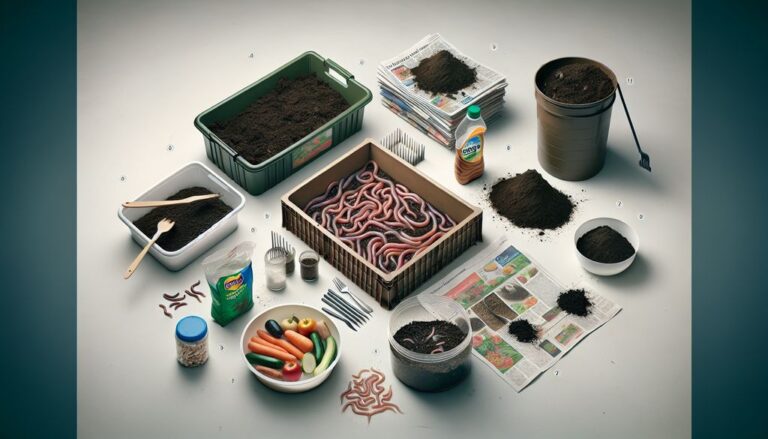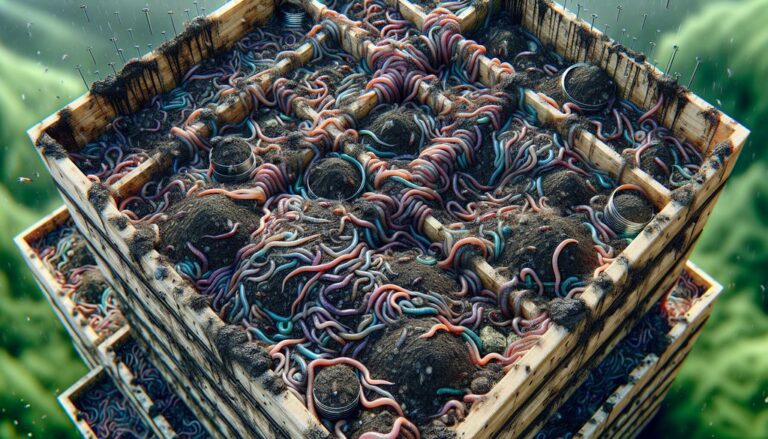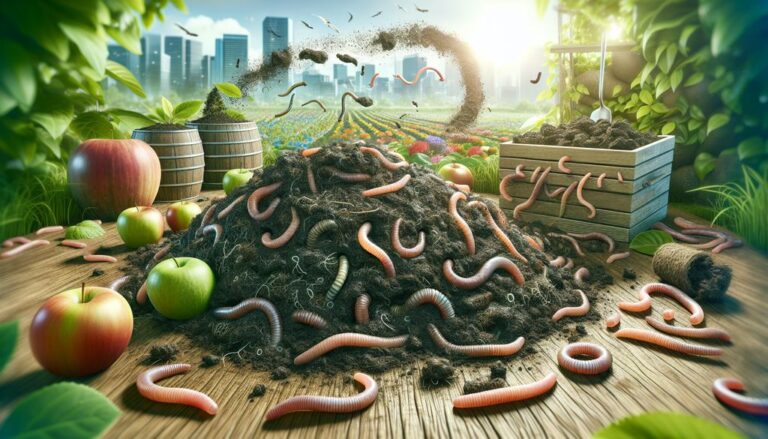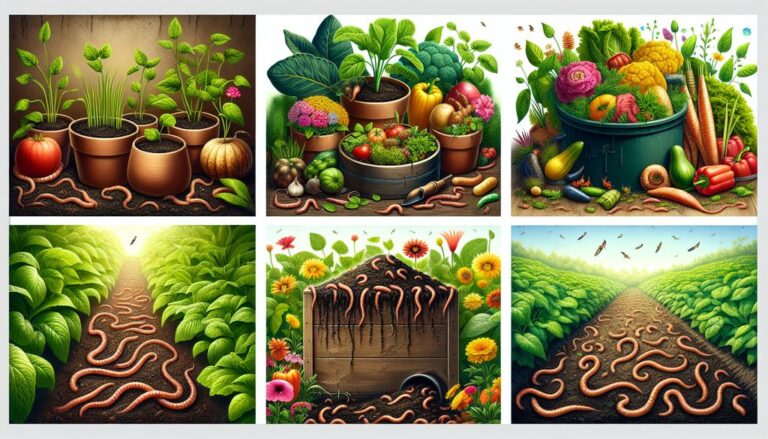Worm castings, also known as vermicast or worm poop, are a nutrient-rich organic fertilizer produced by earthworms. In this guide, we will explore the fundamentals of worm castings, how to incorporate them into your gardening routine, and the process of brewing nutrient-rich worm tea from worm castings. From improving soil structure to boosting plant health, worm castings offer a wealth of benefits for gardeners and plants alike. Let’s dive into the world of worm castings and discover how to harness their power for a thriving garden!
Key Takeaways
- Worm castings are a nutrient-dense organic fertilizer that improves soil structure and promotes plant growth.
- Incorporating worm castings into gardening practices can enhance plant health and vigor without the risk of overindulgence.
- Brewing nutrient-rich worm tea from worm castings provides a liquid gold for leaves and roots, promoting lushness in plants.
- Worm castings are a sustainable solution for small space and urban gardeners, offering a versatile and effective soil amendment.
- The benefits of worm castings extend beyond feeding plants, as they also build ecosystems teeming with beneficial microbes and improve water retention in the soil.
The Fundamentals of Worm Castings
What is Worm Casting Compost?
Worm casting compost, often simply known as worm castings, is the end-product of the breakdown of organic matter by composting worms. These nutrient-rich castings are essentially earthworm waste and are highly valued in gardening for their ability to improve soil health and plant growth. Unlike traditional compost, worm castings are finer and more uniform in texture, making them an excellent soil amendment.
Worm castings are a natural fertilizer that can be used directly in your garden or potted plants. They are odorless, clean, and can be applied without the fear of burning delicate plant roots, unlike synthetic fertilizers.
Here are some key benefits of using worm castings in your garden:
- Nutrient-rich: They provide plants with essential nutrients.
- Improved soil structure: They enhance soil aeration and water retention.
- Eco-friendly: Using worm castings supports sustainable gardening practices.
Whether you’re a seasoned gardener or just starting out, incorporating worm castings into your routine can lead to healthier plants and a more vibrant garden.
What Makes Worm Castings an Organic Superfood for Plants
Worm castings, often referred to as ‘Black Gold,’ are the powerhouse of organic gardening. These tiny, football-shaped particles are the byproduct of earthworm digestion and are teeming with life-enhancing qualities for plants. They are a natural fertilizer that slowly releases nutrients, ensuring that plants receive a steady supply of what they need to grow strong and healthy.
- Nutrient-Rich: Castings are packed with nitrogen, phosphorus, potassium, and micronutrients essential for plant growth.
- Microbial Activity: Beneficial microbes in castings help in nutrient uptake and disease suppression.
- Soil Structure: They improve soil aeration and water retention, fostering robust root systems.
- Pest Deterrent: The natural properties of worm castings can help deter pests from attacking plants.
Worm castings are a sustainable choice for gardeners, offering a multitude of benefits without the risk of over-fertilization. Their slow-releasing nutrients and soil-improving characteristics make them an invaluable addition to any garden.
Worm Castings 101
Worm castings, often referred to as ‘Black Gold’ by gardeners, are the nutrient-rich end-product of earthworm digestion. These castings are a powerhouse of organic matter, providing a multitude of benefits for your garden’s soil and plants. Unlike synthetic fertilizers, worm castings release nutrients slowly, ensuring that plants receive a steady supply without the risk of chemical burn.
To incorporate worm castings into your garden, follow these simple steps:
- Mix the castings into your potting soil or garden beds to enrich the soil.
- Top-dress your plants by sprinkling a layer of castings on the soil surface.
- Brew worm tea by soaking castings in water, which can then be used as a foliar spray or soil drench.
Remember, a little goes a long way! You don’t need to use a large amount of worm castings to see significant improvements in plant growth and soil health.
Worm castings are not only beneficial for plant nutrition but also for improving soil structure. They promote the development of beneficial microbes, enhance moisture retention, and help in root aeration. By adding worm castings to your garden, you’re investing in the long-term vitality of your soil and the success of your plants.
Incorporating Worm Castings into Your Gardening Routine
Benefits of Worm Cast Compost
Worm castings, often referred to as black gold by gardeners, are a powerhouse of nutrients for plants. They enrich the soil with essential nutrients and trace minerals, promoting robust plant growth and health. Here are some of the key benefits of using worm cast compost in your garden:
- Nutrient-Rich: Worm castings contain a high concentration of nitrogen, phosphorus, potassium, and many micronutrients vital for plant development.
- Improved Soil Structure: They help to improve the soil’s texture, making it more aerated and conducive to root growth.
- Enhanced Moisture Retention: The ability of worm castings to retain moisture reduces the need for frequent watering and protects plants during dry spells.
- Disease Suppression: Studies have shown that worm castings can help reduce the incidence of plant diseases, such as damping off.
- Increased Yield: Applying worm castings to flowering plants and vegetable gardens can lead to more abundant and vibrant blooms, as well as increased fruit and vegetable yields.
When it comes to gardening, starting with a strong foundation is crucial. Incorporating worm castings into your soil is an easy step that can lead to healthier plants and a more productive garden.
Remember, worm castings are not only beneficial for plants but also for the overall health of your garden’s ecosystem. By improving soil structure and fertility, they create an environment where plants can thrive. Whether you’re a seasoned gardener or just starting out, using worm cast compost is a simple and effective way to give your plants the nutrients they need to grow strong and healthy.
Pure Worm Castings
When it comes to enhancing your garden’s soil, pure worm castings are a treasure trove of benefits. Unlike mixed or diluted products, pure castings provide a concentrated source of nutrients and beneficial microbes directly to your plants. Here’s how to use them effectively:
- Top Dressing: Simply sprinkle a thin layer of castings on top of the soil around your plants.
- Soil Amendment: Mix castings into the soil before planting to enrich the soil with organic matter.
- Seed Starting: Incorporate castings into your seed starting mix to give your seedlings a healthy head start.
Pure worm castings are gentle on plant roots and can be used liberally without the risk of burning delicate seedlings or established plants.
Remember, a little goes a long way. Start with a small amount and observe how your plants respond before adding more. This natural, organic material not only feeds your plants but also improves soil structure, water retention, and root health.
Brewing Nutrient-Rich Worm Tea from Worm Castings
How to Brew Worm Tea
Brewing worm tea is a simple yet effective way to enhance your garden’s vitality. Start with a bucket of dechlorinated water to protect the beneficial microbes that will be brewing in your tea. For each gallon of water, mix in approximately two cups of organic worm castings. Aeration is key, so use an aquarium pump to introduce oxygen and stimulate microbial activity.
To achieve the best results, allow the mixture to steep for 24 to 48 hours. This duration ensures maximum extraction of nutrients without the mixture going sour.
Here’s a quick guide to brewing your worm tea:
- Fill a bucket with dechlorinated water.
- Add two cups of worm castings per gallon of water.
- Aerate the mixture with an aquarium pump.
- Let it steep for 24 to 48 hours before use.
This ‘liquid gold’ not only feeds your plants but also protects them from pests and diseases, while improving soil structure. It’s a gentle, organic way to give your garden a boost without the risk of chemical burn associated with synthetic fertilizers.
Benefits of Worm Tea
Worm tea, derived from worm castings, is a potent liquid fertilizer that offers a multitude of benefits for your garden. It’s a natural elixir that enhances plant growth, improves soil structure, and helps fend off pests. By using worm tea, you’re providing your plants with a rich source of nutrients and beneficial microbes that are essential for healthy growth.
- Nutrient-Rich: Worm tea is packed with essential nutrients that are readily available for plant uptake.
- Soil Health: It improves soil structure, promoting better root health and water management.
- Pest Deterrent: The beneficial microbes in worm tea can help protect your plants from common pests like spider mites.
- Safe for Plants: Unlike synthetic fertilizers, worm tea is gentle on plants and doesn’t pose a risk of nutrient burn.
Worm tea is not just a fertilizer; it’s a living solution that brings vitality to your garden. Its use as a foliar spray or soil drench can lead to visibly healthier and more robust plants.
Remember, brewing worm tea is simple: mix worm castings with water, aerate the mixture, and let it steep for 24 to 48 hours. This brewing time allows the beneficial properties to infuse into the water, creating a powerful organic supplement for your garden. Regular application of worm tea will ensure that your plants receive a consistent supply of the nutrients they need to thrive.
Conclusion
Worm castings, the soil’s unsung heroes, pack a punch for plant growth. They’re nutrient-dense and root-friendly. Add them to your garden beds; watch seedlings flourish with that extra vigor. Make worm tea; it’s liquid gold for leaves and roots alike. Vermicomposting at home? It’s simpler than you think. You’ll create organic fertilizers that feed plants and nurture soil life. Remember: good things grow from the ground up—start with superior soil. Let worm castings lead the way to lushness in your garden.
Frequently Asked Questions
What are the benefits of using worm castings in gardening?
Worm castings enrich soil with nutrients, improve structure for root growth, and boost plant health without the risk of chemical burn.
What exactly are worm castings?
Worm castings are a byproduct of earthworm digestion, a natural fertilizer packed with essential nutrients for plants.
What does adding worm castings do for plants?
Adding worm castings adds vital minerals to soil, promotes strong roots and foliage growth, and improves moisture retention capacity.
How can worm castings be used in gardening and plant care?
Worm castings can be used to enrich potting soils, boost seed germination, inhibit seedling diseases, and improve overall plant health.
What is the difference between worm castings and conventional manure?
Worm castings offer more than conventional manure, as they enrich soil, build ecosystems with beneficial microbes, bolster water retention, and ward off pests like spider mites.
Where can I find worm castings for sale?
You can find worm castings for sale online if you don’t want to bother with composting worms. Worm castings can also improve seed germination rates and inhibit common seedling diseases.

